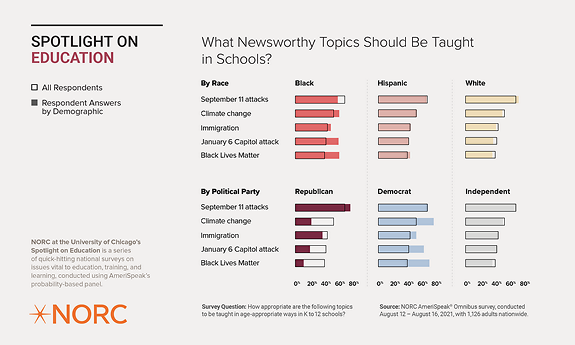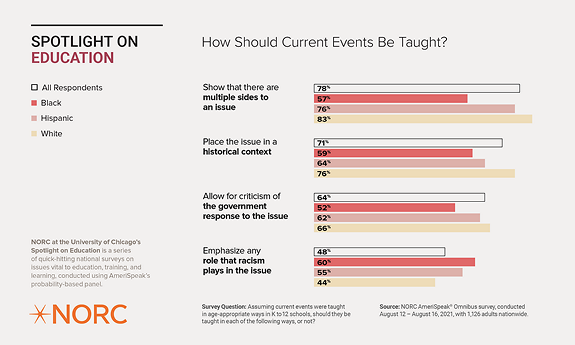White Americans Less Likely to Agree That Newsworthy Topics Connected to Race or Ethnicity Should Be Taught in Schools
CHICAGO, November 4, 2021 – Seventy-five percent of respondents to a nationally representative survey agree that newsworthy topics should be taught in schools. White respondents were less supportive than the national average of teaching K to 12 students about the Black Lives Matter movement (38%) and climate change (52%). The national average includes people from varying racial/ethnic backgrounds, including but not limited to those presented here (e.g., Black, Hispanic, white). The only topic about which white respondents surpassed all respondents surveyed is teaching about the September 11, 2001, terrorist attacks (75%).
The findings come from the latest NORC Spotlight on Education survey powered by AmeriSpeak®. The survey results show more respondents support teaching about the September 11, 2001, terrorist attacks (71%), and climate change (55%) than issues such as immigration enforcement or reform (46%) and the Black Lives Matter movement (42%).
Opinions Varied by Race/Ethnicity and Political Affiliation
Of Hispanic respondents, 56% supported teaching about climate change and 46% about Black Lives Matter. Black respondents were more likely to favor teaching about climate change (63%) and the Black Lives Matter movement (63%) than white respondents, of whom 52% favored teaching about climate change and 38% about Black Lives Matter.
In terms of political affiliation, independents followed the national average. Except for September 11 where 79% of Republicans agreed, Democrats were more likely to agree that newsworthy topics were appropriate to teach and Republicans were less supportive.
“People are in favor of teaching topics discussed in the media in school, but political affiliation and race go a long way in explaining which topics people want students to learn about,” said Shazia R. Miller, senior vice president for Education and Child Development at NORC at the University of Chicago.
Opinions about what is appropriate to teach in schools by race/ethnicity and political affiliation

Black respondents consistently agree that current events should be taught in a variety of ways
Black respondents were more likely to support teaching current events in a way that emphasizes the role racism plays (60%). They also agreed that teaching current events should show multiple sides of an issue (57%), historical context (59%), and allow for criticism of the government (52%). Unlike Black respondents, opinions from Hispanic or white respondents varied by teaching method. For example, 83% of white respondents thought teaching current events should show multiple sides of an issue and 66% thought it should allow for criticism of the government. Fewer still thought current events should emphasize the role of racism (44%).
Racial and ethnic differences exist in how current events should be taught in schools

Americans think school boards should control school curricula
While most respondents believe newsworthy topics should be taught in schools, only 12% believe teachers should get to choose what they teach. Far more (44%) believe it should be up to the school board.
“In the United States, school boards typically play a significant role in determining what gets taught in schools. Sometimes it’s the state board, sometimes it’s the local ones, but these days it’s rare for teachers to have control over what they teach their students. This may mean teachers are limited in how much they can teach about issues in the news,” said Dr. Miller.
Methodology
The self-funded poll was conducted between August 12 and August 16, 2021, during a monthly Omnibus survey. It included 1,126 interviews with a nationally representative sample (margin of error +/- 3.83 percent) of adult Americans age 18+ using the AmeriSpeak® Panel. AmeriSpeak is NORC’s probability-based panel designed to be representative of the U.S. household population. Results are statistically significant at the 0.10 level or lower
About the Spotlight on Education
NORC’s AmeriSpeak Spotlight on Education is a series of quick-hitting national surveys on issues vital to education and its place in society, conducted using AmeriSpeak’s probability-based panel.
About NORC at the University of Chicago
NORC at the University of Chicago conducts research and analysis that decision-makers trust. As a nonpartisan research organization and a pioneer in measuring and understanding the world, we have studied almost every aspect of the human experience and every major news event for more than eight decades. Today, we partner with government, corporate, and nonprofit clients around the world to provide the objectivity and expertise necessary to inform the critical decisions facing society.
Contact: For more information, please contact Eric Young at NORC at young-eric@norc.org or (703) 217-6814 (cell).





